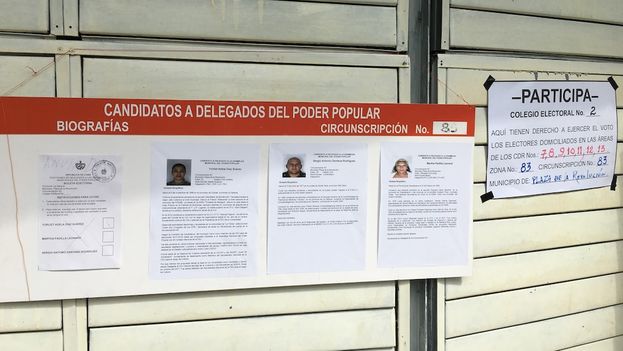
![]() 14ymedio, Havana, 27 November 2017 — The last municipal elections before the departure of Raúl Castro in February passed without surprises, exit polls or political differences between the candidates. During the day, several activists denounced irregularities in exercising their right to vote or access the counts and the rains forced some delays in poll closing times.
14ymedio, Havana, 27 November 2017 — The last municipal elections before the departure of Raúl Castro in February passed without surprises, exit polls or political differences between the candidates. During the day, several activists denounced irregularities in exercising their right to vote or access the counts and the rains forced some delays in poll closing times.
In these elections the delegates to the Municipal Assemblies of People’s Power were chosen for the 12,515 electoral districts of the Island. They will serve in the 169 municipal assemblies that will begin their new term in a few days. Votes were held at 24,366 polling stations across the country.
Manuel Cuesta Morúa, spokesperson for #Otro18 (Another 2018), confirmed that the opposition had not succeeded in getting any of the independent candidates on the ballots, due to pressures, threats and arrests that prevented them from even reaching their area assemblies where the candidates were selected.
For the rest of the citizens, the day passed without great expectations of change and in the midst of an intense campaign in the official media that described the Cuban process as a demonstration of “democracy” and “popular participation.”
“I’d just barely woken up when I had a pionerita (little Pioneer) shouting my name down there,” Claudia, who is 41 and lives in Havana’s Cerro neighborhood, told 14ymedio. The practice of going around looking for voters in their homes has been falling away in recent years in Havana, but this time the government didn’t want to leave time for the latecomers.
“We want all the voting done before three o’clock, but if we have to leave the polls open longer we will do it,” the head of a polling station in the Guanabo neighborhood in the east of Havana told this newspaper. “Everyone who knows a voter who hasn’t come to fill out their ballot has a civic duty to call them,” she added.
Alina Balseiro Gutiérrez, president of the National Electoral Commission (CEN), informed the press that 82.05% of the electorate voted. Balseiro said that CEN will release the preliminary results of this round of elections for delegates to the municipal assemblies of People’s Power on Monday afternoon.
Among the elected delegates will be potential deputies to make up at least half of the candidates for the National Assembly in the general elections that are scheduled for the coming months. The rest of the parliamentarians will be “handpicked” by the almighty candidacy commission.
It will be the job of the new parliament – the National Assembly of People’s Power – on 24 February 2018 to choose, based on the proposal from the Council of State, the successor to Raul Castro for the presidency of the country, and to give way to a new generation, possibly embodied in the figure of the Vice President Miguel Diaz-Canel Bermúdez, who is currently 57.
Raul Castro voted at seven o’clock in the morning at a polling station whose location was not specified. The elections coincided this year with the commemoration of the first anniversary of the death of Fidel Castro.
The official press took advantage of the coincidence of dates to present the elections as a way to honor “the memory of the Commander in Chief” and “continue his legacy.” In most of the polling stations, next to the coat of arms of the Republic and the national flag, an image with the face of the former president was on display.
An independent entity, under the name of Citizen Observers of Electoral Processes (COPE), mobilized about 40 people in 7 provinces of the country to roam between polling stations to “monitor the process of electoral administration, promoting democracy through citizen empowerment.”
From the province of Santiago de Cuba, activists of the Patriotic Union of Cuba (UNPACU) denounced irregularities in the voter registers and obstacles to participating as observers in the counting of votes. The opposition organization had joined the call of the Cuba Decides initiative for voters to write the word “plebiscite” on the ballot.
Manuel Cuesta Morúa affirmed, for his part, to EFE that another COPE, composed of 275 members in 13 of the 15 provinces, undertook “without great difficulties” the tasks of independent observation.
The Cuba Decides campaign, led by Rosa Maria Payá, presented on Sunday a formal request in several polling stations that blank ballots or ballots marked with messages in favor of a plebiscite be counted as valid votes.
UNPACU activist Carlos Amel Oliva reported that several members of the organization received evasive responses from those responsible for polling stations to their request to exercise their right to observe the vote count. Other opponents complained that their names were not even on the voter registers.
“As of midday we have a report of six activists arrested during election day, among them Víctor Campa Almenares, Carlos Oliva Riverí, Alexis Rodríguez Chacón, Vladimir Martín Castellanos, Juan Salgado Jurado and José Antonio Valdés Piña,” he details.
“All these opponents were arbitrarily arrested when they went to the polling station closest to their area of residence to participate as observers in the counting of votes,” he added.
__________________________________
The 14ymedio team is committed to serious journalism that reflects the reality of deep Cuba. Thank you for joining us on this long road. We invite you to continue supporting us, but this time by becoming a member of 14ymedio. Together we can continue to transform journalism in Cuba.
